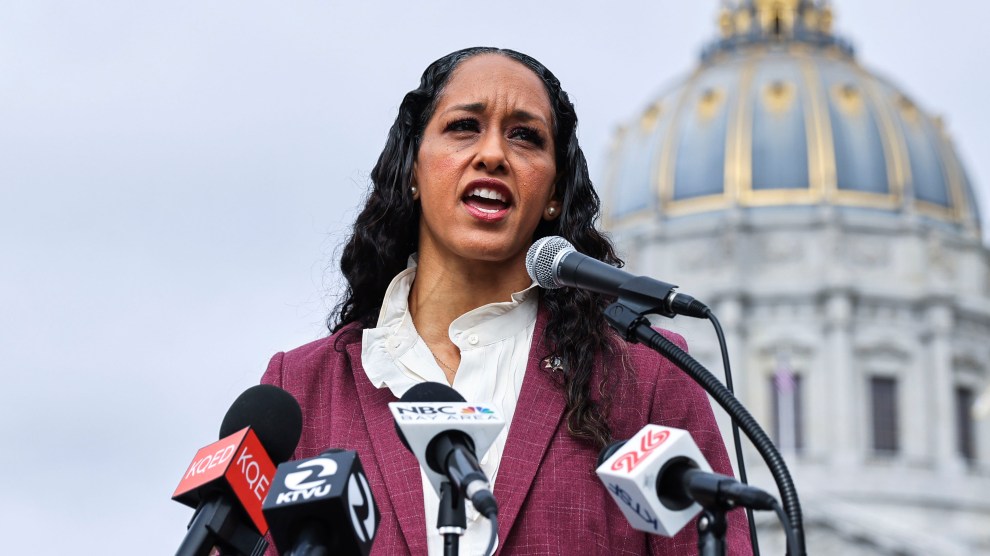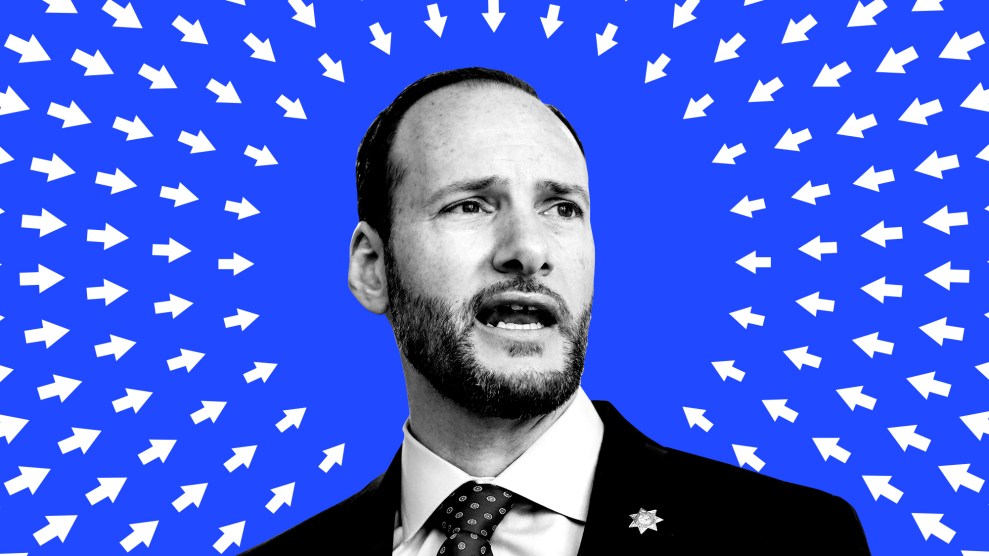In early September, Peterson Harter was working the lunchtime rush in his sandwich shop on San Francisco’s Haight Street when in walked prosecutor Ryan Khojasteh, sporting slicked-back hair and circular glasses.
The year before, Harter had been punched in the face by a man who’d been urinating outside his shop. He posted a video of his black eye on Instagram, and it went viral. Khojasteh, a prosecutor who’s challenging San Francisco District Attorney Brooke Jenkins for her job in November, wanted to hear about his public safety concerns heading into the election.
“I want to prevent that 18- or 19-year-old from getting to a point where they have a gun in their hand.”
Harter told Khojasteh that the man who assaulted him came back to apologize after getting out of jail; he was later arrested again for assaulting someone else. “This guy actually needs mental health help,” said Harter, leaning against the counter in his apron. They began talking about the benefits of early intervention. If only “we could have helped this person way back when,” Khojasteh said.
The question of how to treat young offenders was on everyone’s mind that week. Days earlier, 49ers receiver Ricky Pearsall was shot by a 17-year-old during an attempted robbery near luxury stores in Union Square, making national news. Jenkins may try to transfer Pearsall’s shooter to adult court but hasn’t decided yet. (She’s also recommended transferring two 16-year-olds to adult court in an unrelated case.) Khojasteh says there are very few circumstances in which he’d do the same. “I want to prevent that 18- or 19-year-old from getting to a point where they have a gun in their hand,” he tells me. “That is the whole passion of this job.”
Khojasteh’s emphasis on early interventions is one of the ways he’s setting himself apart from Jenkins, who has taken a more punitive approach to teens after being appointed following the recall of progressive prosecutor Chesa Boudin.
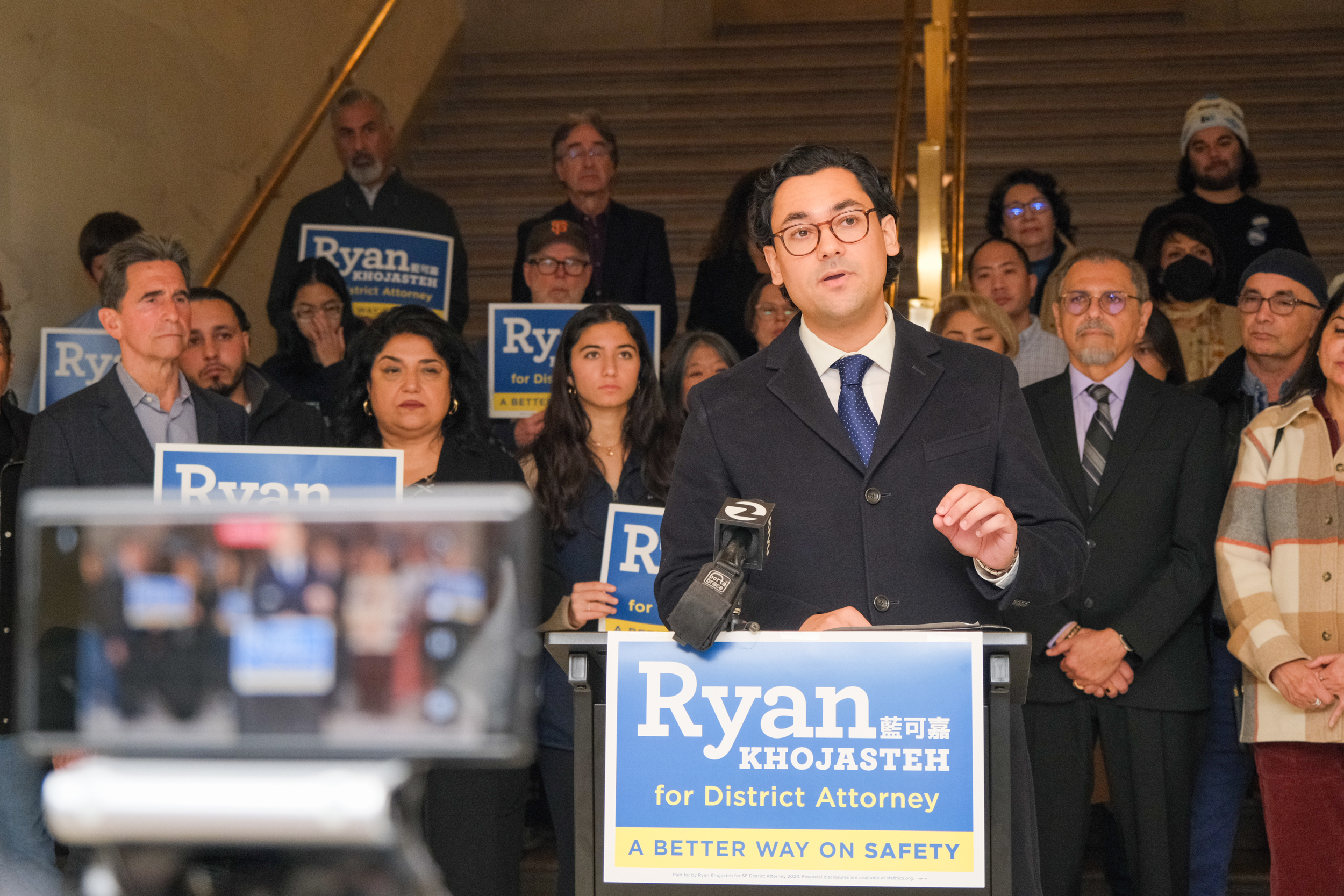
San Francisco’s DA race has not gotten much attention in a presidential election year, but the results will be significant because of what Boudin’s recall represented: Observers nationally described it as evidence that famously liberal San Francisco had rejected criminal justice reforms, and that other progressive prosecutors outside California should beware a similar fate. Jenkins pledged to “restore accountability and consequences” to the city. If she loses, it could signal that voters believe the pendulum swung too far right under her leadership.
Khojasteh has welcomed endorsements from heavyweights in the progressive prosecutor world, including George Gascón in Los Angeles and Larry Krasner in Philadelphia, and from a slate of local progressive politicians and community leaders. But he is young, turning 31 next month, with less money, name recognition, and establishment support than Jenkins, who is endorsed by Mayor London Breed and Gov. Gavin Newsom.
And he will be trying to sell voters on his message about helping youthful offenders at a time when fears about violence are intensifying. Though juvenile crime has been falling for decades in San Francisco (and nationwide) to near historic lows, there’s been an uptick recently in kids arrested for serious offenses in the city. Not far from Harter’s sandwich shop, there were at least three other shootings over the past couple of years near Haight Street, a popular tourist destination; some of the gunmen were younger than 25. When Khojasteh spoke with other shopkeepers there, several said they didn’t feel safe. “The cops sadly don’t do anything,” an employee at a cafe told him.
As I tagged along with him on Haight Street, Khojasteh tried to convince people that he would offer a middle path between Boudin, a bold progressive, and Jenkins, a tough-talking moderate. “Anytime anyone commits a crime and I can prove it, I’m going to file charges,” he told a shopkeeper. But “the question is: How do I make sure they don’t come back into the system?” That’s what justice is, he says: figuring out how to keep someone accountable and keep them from coming back.
Khojasteh’s long-game approach to justice was shaped during his childhood. Raised in the Bay Area to Iranian immigrants, he was a toddler in 1996 when his family suffered a death that would cause him to question the root causes of youth violence. His uncle Cyrus Salehi was working the late shift at a Denny’s restaurant in Los Angeles when a 20-year-old walked inside, demanded money, and then aimed a pistol at his chest; two 18-year-olds and a 16-year-old sat outside with the getaway car. As Khojasteh grew older, the loss motivated him. “Why does this happen in the first place?” he wondered. “Why are there kids at that age with guns?” After Salehi’s wife got remarried, to a bureau chief of the Los Angeles DA’s Office, Khojasteh decided he wanted to become a prosecutor too.
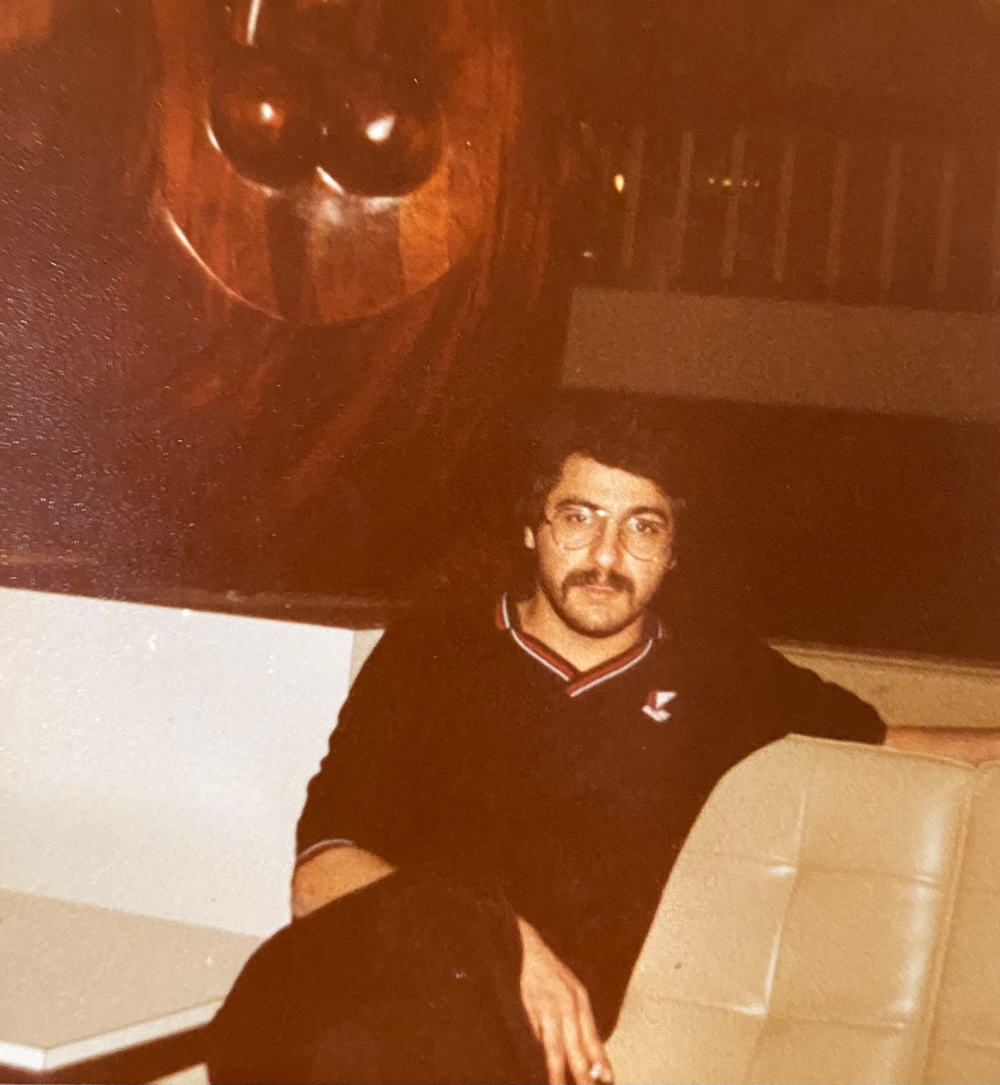
He interned at the Santa Clara DA’s office after undergrad, then graduated early from UC College of the Law, San Francisco, in 2018, where he wrote a thesis on ending the school-to-prison pipeline. He also worked up the nerve, at age 24, to run against Nancy Pelosi for her seat in the House. (He lost.)
Next up was a fellowship at the San Francisco public defender’s office, where he met Chesa Boudin, then a deputy public defender. “For someone at his point in his legal career, he had a unique confidence,” Boudin says, describing Khojasteh as “hardworking, compassionate,” and eager to grow. “When I learned he’d run for office against Pelosi, I thought, ‘What a tremendous amount of character that would build, and what a steep learning curve it would be at his age.’”
Working with Boudin would have a deep impact on the way Khojasteh thought about helping teens who committed crimes. After Boudin was elected DA in 2019, Khojasteh was one of his first hires in the juvenile justice unit, as an assistant DA. Change was in the air; the San Francisco Chronicle had just published an investigation showing that youth crime had dropped enormously since the ’90s, but that San Francisco continued spending large sums of money on a juvenile hall that now held fewer and fewer kids. In February 2020, the San Francisco Board of Supervisors voted to close the facility by 2021. “This jail for kids is morally repugnant,” said then-Supervisor Matt Haney. “I thought Ryan’s compassion and energy would be particularly useful” carrying out that mission, says Boudin.
Together, Khojasteh and Boudin tried to do more to connect kids with services rather than locking them up. They expanded the Make It Right initiative, launched by former DA Gascón in 2013 for teens who committed certain felonies. If the young offenders worked with a caseworker, talked with the person they harmed, and took steps to repair the damage, including through community service, they could avoid prosecution. Kids who went through the program were 44 percent less likely to get arrested again compared with those who were prosecuted, according to a study by University of California researchers and the California Policy Lab.
Kids who went through the program were 44 percent less likely to get arrested again compared with those who were prosecuted.
Boudin leaned on these services, diverting more teens than Gascón and pledging to use juvenile hall as a last resort. For more serious cases that required prosecution, he and Khojasteh tailored the punishment. When a 12-year-old robbed an elderly Chinese man, they filed charges but asked the victim what kind of justice he envisioned: The man wanted the boy, who was Black, to research the exploitation of Chinese people in America and think about their shared oppression. The boy also did community service, and the DA’s office checked to make sure he was going to school. Six months later, his mom reported that she’d never seen him behaving so well. “That had much more impact on his life and development than a couple of days in jail,” Khojasteh says.
Another time, Khojasteh prosecuted a 16-year-old who committed a serious property offense and was waiting in juvenile hall for placement at a residential school; the boy’s single mom couldn’t visit him because she was in hospice care with about a month to live. “I remember thinking, ‘If we keep this kid in juvenile hall, that would profoundly traumatize this child, the fact that he would never see his mother again,’” Khojasteh says. He arranged for the boy to leave and be with his mom for her last few days before returning to finish his sentence. “We don’t want to further cause the psychological damage that could ultimately cause him to act out or commit more crimes in the future,” he adds.
Khojasteh thinks some cases involving young people do require a tougher approach, especially if a victim is injured. He has incarcerated kids for offenses like carjacking. Juvenile hall “is a tool to protect the public and to protect the kid,” he says. But the number of children locked up for crimes fell dramatically in San Francisco under Boudin’s leadership—from an average of 33 kids a day in January 2020, when Boudin took office, to 9 kids daily in June 2020 and 16 kids daily in June 2021, according to city data. (Part of the drop can be explained by the pandemic: Social distancing forced detention facilities to downsize, and courts temporarily stopped trials.)
While working in Boudin’s office, Khojasteh also helped create a program for unaccompanied immigrant kids who committed crimes, and another that offered financial assistance to teens so they could pay restitution to their victims. Without the aid, the owed money often turned into debt for the teens’ parents, affecting the family’s credit score and upward mobility by making it harder to apply for housing or student loans.
San Francisco’s juvenile hall never shut down; Mayor Breed did not support its closure, and momentum for the plan dwindled. Then on June 7, 2022, San Francisco voters recalled Boudin, many of them frustrated by his perceived leniency amid heightened drug use and homelessness, as well as community violence against Asian American elders and viral social media footage of car break-ins and store thefts. (Though overall crime fell during Boudin’s tenure, commercial burglaries and homicides increased in San Francisco, as they did nationally around that time.) After the recall, Khojasteh urged Breed to pick a new DA who would continue the work he and Boudin had started on juvenile justice. “San Francisco deserves to see these reforms through,” he wrote in an op-ed for the Chronicle that July.
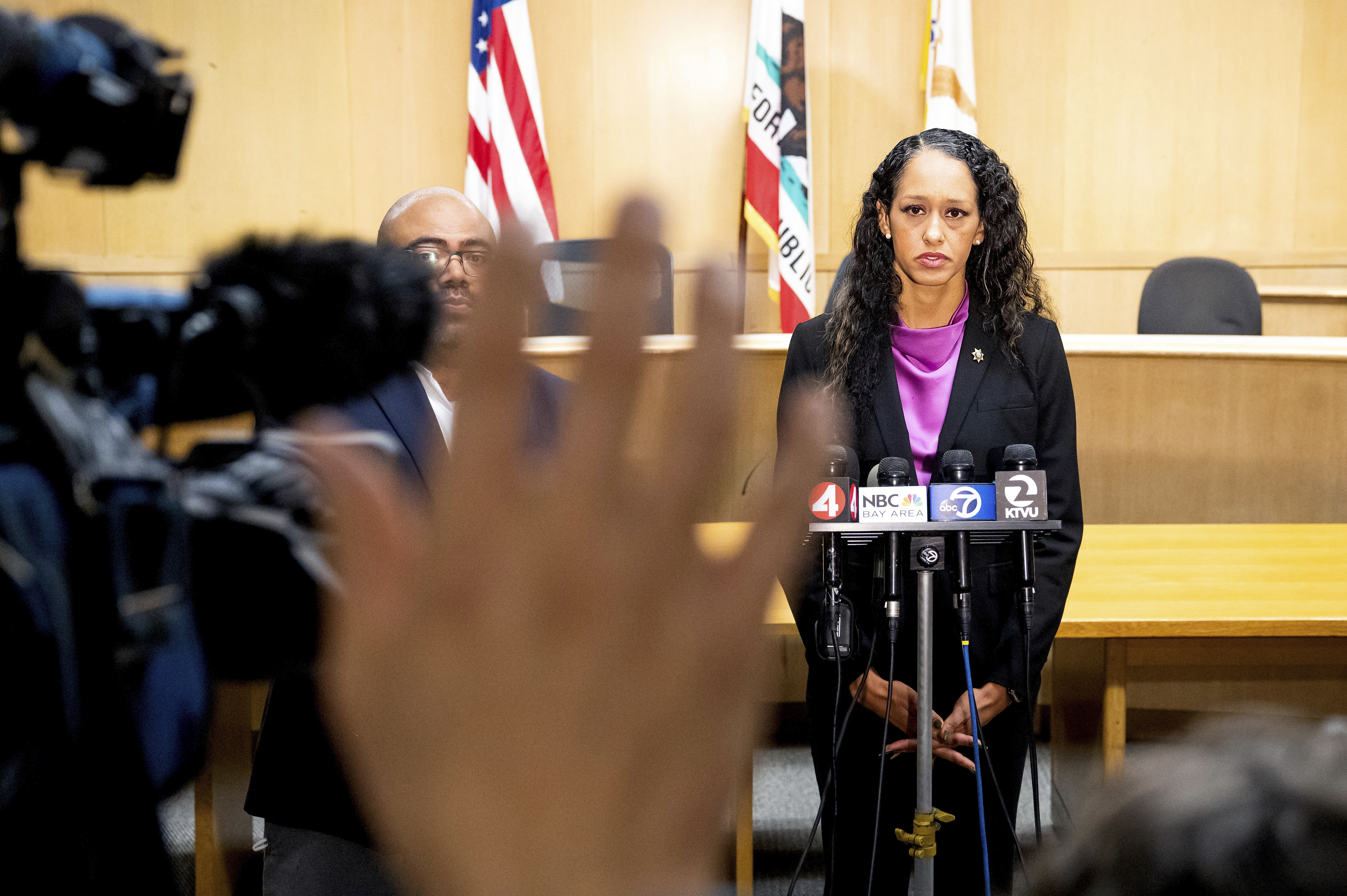
That’s not exactly what happened. Three days after the op-ed ran, Breed announced that Jenkins, a former assistant DA who’d quit Boudin’s office and then campaigned to recall him, would be the city’s next lead prosecutor. Khojasteh, now working on adult felony cases, tried to extend an olive branch: After Jenkins told staff she wanted to improve morale at the office, he emailed her to share his thoughts on how staffing increases in the felony unit might accomplish that. Days later, while he was at a family wedding, she called and fired him. “It was such an inappropriate way to handle this,” he tells me, frustrated that she didn’t give him time to write transition memos. He contemplated running against Jenkins in the November 2023 election but was not old enough; the law requires candidates to have worked five years as attorneys, and he would be several months shy of that. Instead, he got a job in Oakland at the Alameda DA’s office.
From afar, Khojasteh watched as Jenkins took a harder turn against San Francisco’s teen offenders.
From afar, Khojasteh watched as Jenkins took a harder turn against San Francisco’s teen offenders. In September 2022, juvenile justice reform groups protested outside her office after she announced that she would consider charging children as adults in certain “heinous” cases, a departure from Boudin’s policy. “We won’t stand by and let our youth be criminalized!” Ally Durante, a youth organizer at the Young Women’s Freedom Center, yelled into a microphone.
Jenkins’ office also referred fewer teens with felony cases to diversion programs like the ones Khojasteh and Boudin had championed, according to Khojasteh, Boudin, and other attorneys who specialize in juvenile justice. It’s “back to the traditional approach,” says Daniel Macallair of San Francisco’s nonprofit Center on Juvenile and Criminal Justice. “It’s been difficult to work with her,” says Julia Arroyo, executive director of the Young Women’s Freedom Center, which mentors girls in the justice system. Lucero Herrera, who also works at the center, says Jenkins’ office stopped referrals to their programs without explanation: “She believes in charging young people, overcharging them.” The DA’s office and Jenkins’ campaign did not respond to my request for comment on these claims. In 2023, when the Chronicle reported that Jenkins was referring fewer adults to diversion programs, she said her team was more “thoughtful” than Boudin’s about selecting participants.
Because San Francisco has long been a leader on juvenile justice, says Macallair, kids with good public defenders and community advocates have continued to get connected with services in the city, despite Jenkins’ new policies. But she has also gone tougher on them in other ways. Her office has charged more strikes against teens, something Boudin and many other DAs in California have tried to avoid. Strikes remain on a kid’s record into adulthood and three of them can lead to harsher sentences.
Jenkins also made the unusual move of refusing to try new cases in front of a judge who took a progressive approach to juvenile justice late in his career. “She’s attacked judges in a way that’s unprecedented,” the now-retired judge, Anthony Kline, tells me, adding that her reluctance to refer both kids and adults to treatment-focused programs is “out of sync with the modern standards of criminal justice.” Under Jenkins, the number of kids at juvenile hall increased nearly threefold—from an average of 12 kids per day in June 2022, the month Boudin was recalled, to 31 kids a day in October 2023, a peak, and then 27 kids in July 2024, the last month for which data is publicly available.
In November 2022, San Francisco voters passed a ballot measure that pushed back the next DA election from 2023 to 2024, a change that meant Khojasteh would be experienced enough to run. This summer, he left the Alameda DA’s office to campaign full time.
If he's elected, Khojasteh wants to beef up the general felonies unit as well as the special prosecutions division, which handles public corruption, major financial crimes, and police violence; Jenkins downsized it and dismissed all the charges that Boudin had filed against cops. He wants to hold workshops with residents to teach them what to do if they are victims of crime. And he wants to expand the use of collaborative treatment courts for people who break the law because of drug addiction.
When it comes to teen offenders, he says he would increase referrals to the juvenile diversion programs he helped expand under Boudin, and he’d restart the relationship with the Young Women’s Freedom Center and other community groups. “We want to bring our community-based organizations into the fold when it comes to developing treatment plans and resources for kids,” he says.
Khojasteh has avoided labeling himself a “progressive prosecutor,” wary of the recall movements that other progressives like Boudin and now Oakland’s Pamela Price have faced. In a public conversation with Mission Local managing editor Joe Eskenazi in June, Khojasteh described his top goal as public safety and said he was not seeking Boudin’s endorsement, though he’s still in touch with his former boss: “I’ve certainly had conversations with him on how I can not make some of the mistakes that he made.”
As I shadowed Khojasteh on Haight Street in September, I saw him talk with shopkeepers about accountability and pledge to prosecute whenever a crime is committed. Later, I asked him to elaborate on how he could make these promises while still prioritizing rehabilitation for kids. It was then that I saw how he might be more moderate than Boudin, even while maintaining a similar ethos. Khojasteh explained that Boudin’s office sometimes gave kids charges that were less serious than what the police had alleged. Teen robberies, for instance, were sometimes charged as thefts so that kids didn’t end up with strikes on their records. He believes this left prosecutors at a disadvantage during negotiations with defense, because the DA's starting offer was already so sweet.
“I have that middle path between Chesa and Brooke."
Khojasteh would take a different approach: He would charge whatever crime is supported by the evidence, including robberies, but would later negotiate the charges down—so that kids would still face consequences without getting a strike or record that might keep them from securing a job or financial aid after their punishment. “I have that middle path between Chesa and Brooke,” he told me. “I will still file the charges for serious cases—I'm going to hold you accountable—but I can do so in a way that lets you go on into adulthood with every tool at your disposal.”
Khojasteh diverges from his former boss in other ways. He does not support a blanket ban on trying 16- and 17-year-olds as adults, but says he’d only consider doing so in extreme cases like a mass school shooting. Nor does he support a blanket ban on gang enhancements, stiffer punishments that disproportionately affect people of color, though he views these enhancements with “disdain” and would generally avoid them.
Khojasteh declined to say whether he would charge the 17-year-old who shot 49ers receiver Pearsall as an adult, explaining that he hadn’t seen all the details of the case. But in late September, after Jenkins asked a judge to transfer two 16-year-olds to adult court for an alleged murder, Khojasteh criticized her decision. “This is election-year politics at the expense of justice,” he told me, noting that Jenkins made the transfer request a mere days before the kids were scheduled to go to juvenile trial, which is unusually late in the process, and just over a month before Election Day.
Jenkins told me she made the request because she did not believe the teens could be rehabilitated in the juvenile system, which can hold them until age 25. “I will not allow us to return to the days where blind loyalty to a failed dogma reigned supreme and perpetrators were not held accountable or faced consequences for their crimes,” she said. Khojasteh points out that if the kids were held in juvie until age 25, that would be more than half their current lifetimes incarcerated; if convicted in adult court, they face up to life in prison.
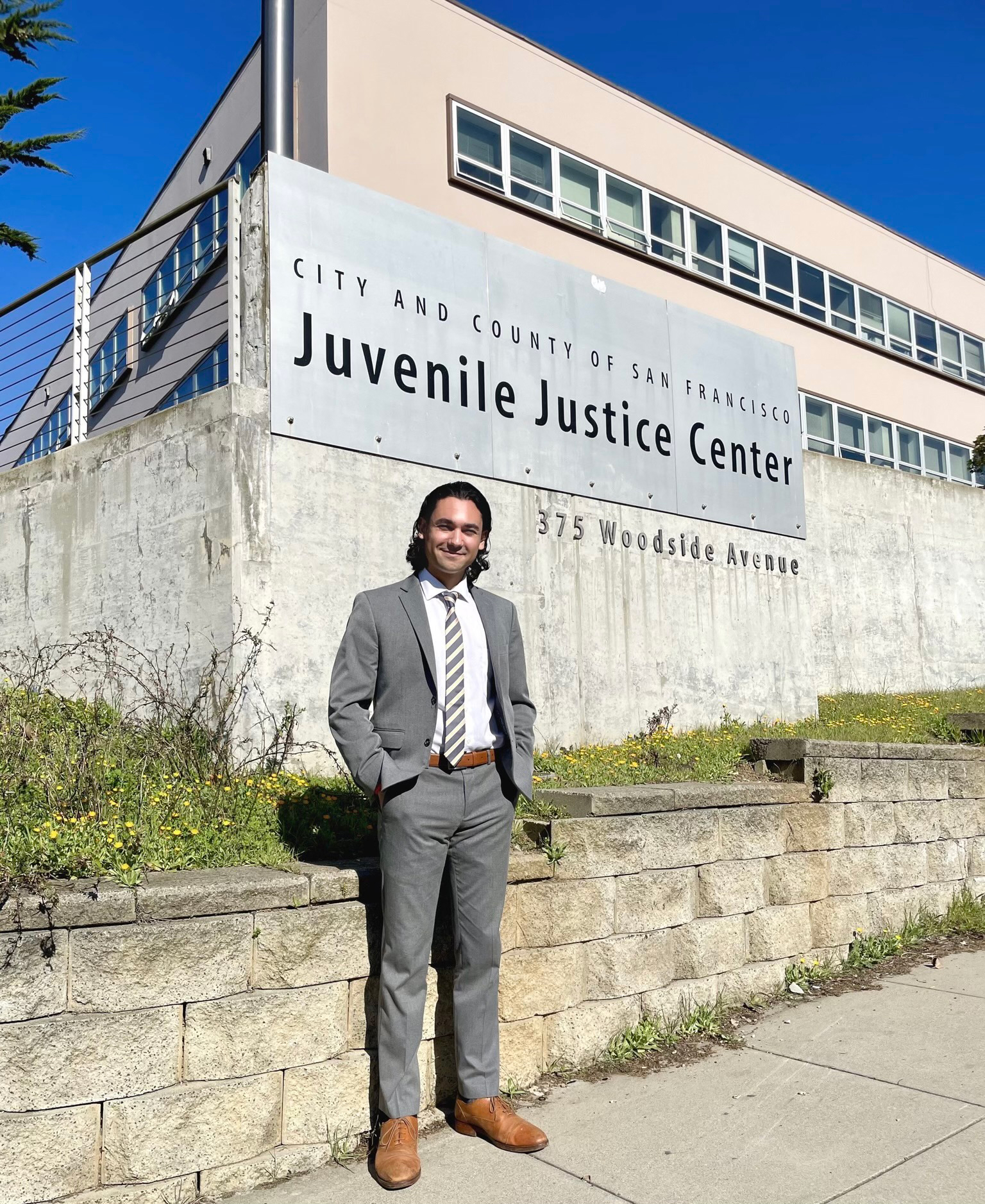
Whether Khojasteh can win enough votes remains to be seen. He’s the only challenger in the election. Jenkins has faced some recent setbacks: A court ruled that she committed misconduct in 2021 by disparaging a defense lawyer. Dozens of attorneys have left her office, some of them citing mismanagement. And a record number of drug overdoses in San Francisco last year fueled allegations that her crackdown on dealers isn’t making the city any safer. “People are frustrated and becoming disillusioned because nothing is changing,” retired San Francisco Judge Ellen Chaitin, who opposed Boudin's recall, told the San Francisco Standard.
There are some signs that Khojasteh’s message, meanwhile, is finding traction. Peterson Harter, the man who went viral for his black eye, agreed to put a campaign sign in his sandwich shop after Khojasteh’s visit. “Accountability and support—can we have those two things?” Harter said, moving his hands up and down like a scale.
Later that day in the Haight, a woman on the street stopped Khojasteh; she wanted to learn more about his juvenile justice stances, because her sister had spent time in a mental health facility and said too many kids there were later locked up. “The way we treat our young people says a lot about our values and our society,” says Celi Tamayo-Lee of the SF Rising Action Fund, a grassroots fund for communities of color.
But Jenkins has backing from San Francisco’s moderate political machine—I’ve heard rumors that her sights are set, eventually, on California’s attorney general office, the same path Kamala Harris took from the San Francisco DA’s office. (She did not reply when I asked her about this.) And she has funding from some of the rich execs who paid for Boudin’s recall: As of this month, campaign filings showed she’d garnered $368,000 for the election, compared with Khojasteh’s $105,000. She has declined to publicly debate him, making it harder for him to get media attention. “The fact that Brooke is an incumbent works to her advantage, and there has been a trend for voters to favor more tough-on-crime policies right now in San Francisco,” says Tamayo-Lee. Voters there recently passed ballot measures that decreased police oversight, increased police surveillance, and required people to get drug-tested in order to receive certain social services.
And then there’s the question of Khojasteh’s youth. Jenkins, 43, is more than a decade senior. Over the summer, Mission Local’s Eskenazi teased him for trying to look older than his years by cutting his long hair short and donning “Clark Kent glasses.” (They’re Garrett Leight.)
Khojasteh doesn't seem fazed. He tells me he did away with his long hair because he wanted to mark the transition into his 30s. He bought glasses because he couldn’t see the board during law school, though he soon realized (and embraced) that fewer people confused him for an intern when he wore them to court.
In fact, Khojasteh sees his youth as a plus. Unlike older politicians with ambitions for higher office, he says he can afford to stick around San Francisco as long as it takes to make the city safer, to balance accountability with the services and compassion that might keep people out of the justice system for good. There’s “value in me being a young candidate,” he told me before looking out onto Haight Street and all the people walking by. “I’m committed to San Francisco—this is my home. And I can be here for a long time.”

